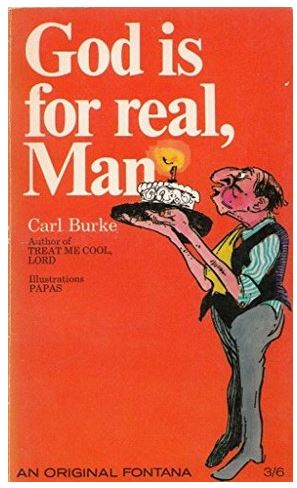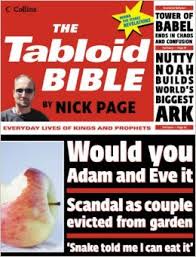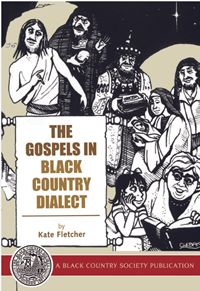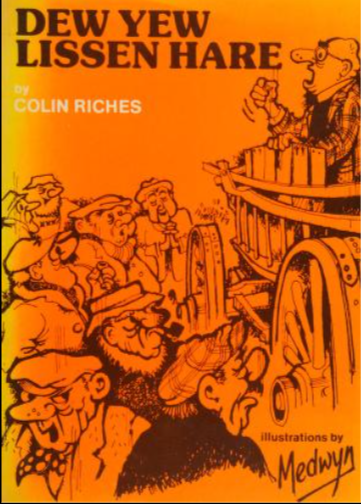Data Visualisation: How do you spell “Colour” April 14, 2024
Posted by Pete B in multilingualism, Statistics.add a comment
Alternate title: Data Visualization: How do you spell “Color”
It all started when I asked ChatGPT to write a couple of short articles about some of the fascinating challenges of data visualistion for different audiences around the world. I used British spellings (because I’m a Brit and am aware that British spelling is also used in many other places), but I didn’t really have a clear picture of which countries follow British spelling and which follow American spelling reforms? I asked the internet and it seems the answer to that isn’t simple…
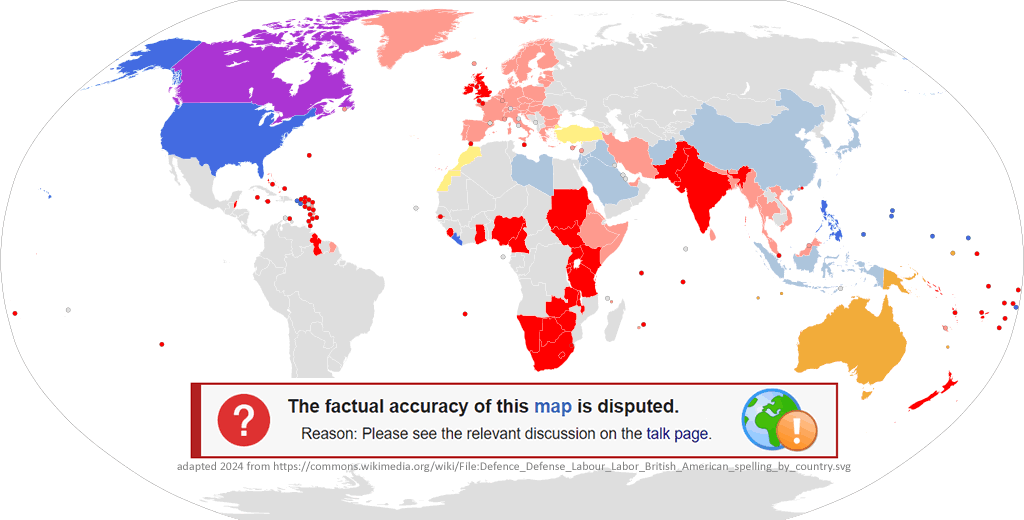
I found the map above at a wikipedia page on American and British English spelling differences, and clicked through to the graphic’s source in the Wikimedia Commons where there were a few people challenging its accuracy on the talk page.
Comments on “EU countries spell organise and colour“, include “No, we don’t.” and “Meh. The whole thing is irrelevant” and “Officially yes, but unofficially no“
There are further comments on use in Indonesia, East Africa, PNG and Nauru, Latin America and eighteen other countries. At this stage I’m not going to dig further into what is actually taught in schools, used by governments, media or used by different demographics within the general population but it does seem that in an interconnected world it is somewhat ethnocentric to assume that either Britain or America ‘owns’ the rules on spelling.
A short (and incomplete) listing of Bible translations and adaptive retellings in English dialects February 24, 2024
Posted by Pete B in Dialect versions, Scripture Engagement.Tags: Bible translation
add a comment
Recently Angela Lu Fulton writing for Christianity Today asked, Should the Bible Sound Like the Language in the Streets?, I had a chat with her while she was researching the article and it’s a question I’ve been pondering for a few years, because language isn’t just about whether it’s in English or German, or Tagalog, but also what style of language and perhaps in what regional dialect.
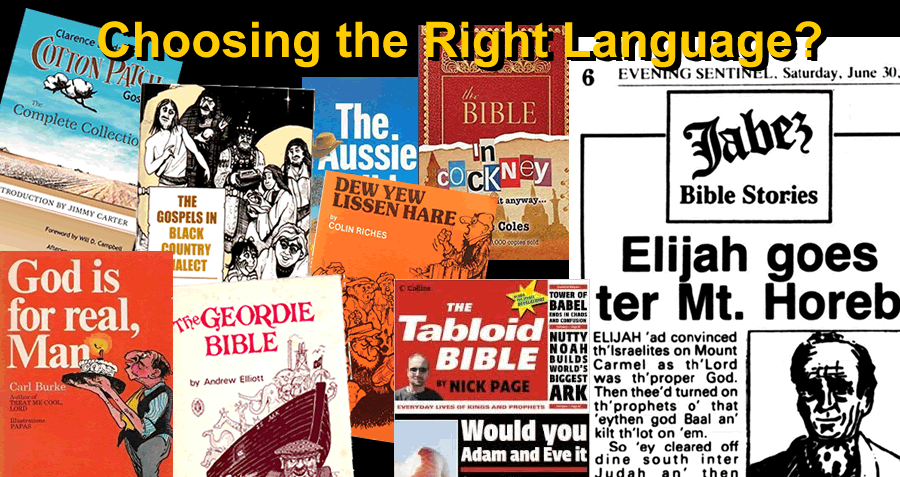
I’ve written several posts about English dialect translations and retellings of the Bible (or bits of it). Those I’ve encountered are nearly all well intentioned attempts to help people engage with the Bible and recognise it as relevant to their own lives.
Here’s a list of those I’ve encountered so far with links to where you can find some of them and a few comments.
God is for Real, Man, by Carl F. Burke, Chaplain of Erie County Jail, Buffalo, New York; Association Press, New York; 1966 by National Board of Young Men’s Christian Association.
Retellings in the street language of inner city New York that I as a young Brit came across in a church library 30 years ago. (see blog from May 2017)
The Tabloid Bible, by Nick Page 1998, was something I came across at the time and mentioned in a blog in 2015. The humorous take on some Bible stories probably appealed to some and appalled others.
God’s Brainwave, by Bernard Miles
The Story of Jesus doing the job his old dad sent him to do”, a retelling of the gospel in the language of the Chiltern Hills, and originally commissioned by the BBC’s Religious Broadcasting department as a series of radio slots and released as an LP in the UK, Canada and Australia in 1970. (see blog from April 2019)
I already had a copy of Gospels in Black Country Dialect, by Kate Fletcher, 1986
but a little Googling uncovered an older treasure, Have Yourself a Bostin’ Christmas, Michael Prescott, 1968, and a later video of it being read. (see blog from Dec 19, 2019)
The Gospels in Scouse, Rev Dick Williams and Frank Shaw1967
(See blog from Dec 16, 2022)
The Cockney Bible, Michael Coles, 2001, was the work of a school teacher trying to engage his pupils.
Rereleased in 2022 by the Bible Reading Fellowship
The Aussie Bible (well, bits of it anyway) retold by Kel Richards, Bible Society of NSW, 2006, and inspired by the Cockney Bible and those that had gone before.
(See blog from Dec 17, 2022)
Th’ Amazin’ Stories o’ th’ Bible (i’ th’ Lankisher Dialect), Rev. Joseph Barlow Brooks, (1937)
Th’ Good News accordin’ to Mark : Arrang’t an’ thranscrib’t fer Northerners, i’ th’ Lankisher dialect, 1937
Samples of the text are downloadable here as part of thesalamancacorpus.com
Dew Yew Lissen Hare, by the Rev Colin Riches 1975 (Norfolk Dialect) is borrowable via the Internet archive , with print copies still circulating second hand. Rather than reproduce any of the Bible stories themselves I’ll include a snapshot from the preface.

The stories themselves did indeed feature on TV, and more than 4,000 copies of the book were sold within weeks. A second volume “Orl bewtiful and new was published in 1978. Sadly I’ve not located any recordings.
The Geordie Bible, By Andrew Elliot, 1971,
The Cotton Patch Gospel, by Clarence Jordan …which I could say something about but which received more scholarly attention from former SIL International Director, Freddy Boswell, “Classifying cotton patch version and similar renderings as adaptive retelling rather than translation“. Oh, and a later edition also had an introduction from President Jimmy Carter.
(See blog from Dec 26, 2022)
There are also a few I’ve not mentioned before:
I should mention that I found quite a few of the above thanks to a list of English Dialects, Slangs and Pidgins at http://bibles.wikidot.com/dialects. There are a few more on the list that I’ve not tracked down and a few I’ve discovered simply by googling Bible and the name of a dialect.
Others just seem to show up in my feed now. The article I mentioned at the start Should the Bible Sound Like the Language in the Streets? focuses on how “Controversy over Bibles in Jamaica, the Philippines, and Germany reveal the divide between the sacred and the relatable.”
A new one for my collection is The Black Bible Chronicles: From Genesis to the Promised Land, P.K. McCary, 1993
As with other retellings in street language this also came with a foreword by a prominent figure, this time from the “Honourable Andrew Young, former Ambassador to the Unted Nations, Former Congressman and [then] Mayor of Atlanta”. He was also a pastor and prominent civil rights activist. I’ve bought the book but actor Ben Vereen probably reads it better…
…and in my home county of Staffordshire, UK I discovered “Jabez retells Bible stories” stored away in the archives of Keele University. These were the works of Dr Wilfred Bloor who wrote in Staffordshire dialect for a local newspaper between 1968-1993. Again there are some recordings I’d love to get hold of, but have yet to hear.
Alongside translations and retellings there have also been many other attempts to help bridge the ‘relevence gap’, between reader and text, through readings songs, and movies, but that’s a whole other set of posts.
While choosing the right language, and style of the translation or retelling, along with the right media are indeed key elements of Scripture Engagement, they are not the only ones. For a few more collected under eight useful categories check out out the discussion starters and questions at emdc.guide.
Living Water …a different kind of audio Bible February 13, 2024
Posted by Pete B in Audio Bibles, Scripture Engagement.Tags: bible, bible-reading, bible-study, scripture
add a comment
I recently realised that across the different bible apps on my phone I have access to over 30 different audio Bibles, read from different versions, in many different voices, and with or without a backing track, but I didn’t realise until yesterday that I had the entire New Testament sung by award winning Gospel artists to a piano accompaniment.
It is provided as one of the options on YouVersion for listening to the ESV. Clicking below will take you to https://lbt.org/livingwater/ where you can both hear the full text of the ESV New Testament sung, and hear a little of the story behind it the project which launched in 2022 releasing one chapter per day.
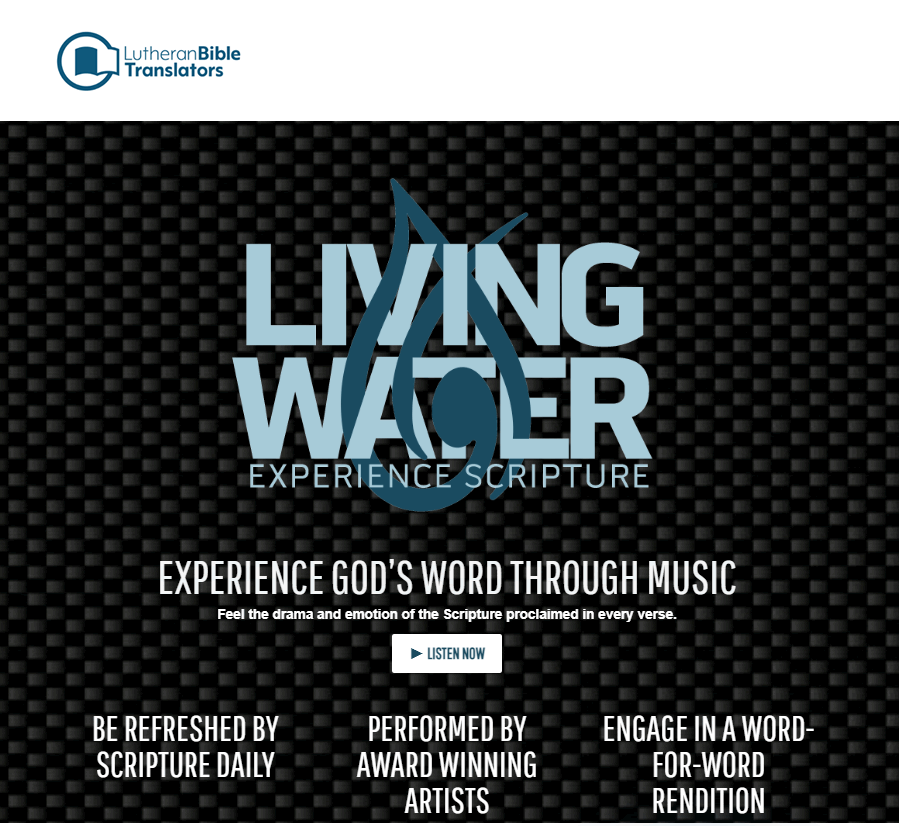
As the website explains this is not the first time scripture have been sung, in fact the Psalms themselves provided inspiration for the project and there is a long history of singing scripture and prayers. Perhaps more on the history of sung scripture in another post, and certainly more on the many audio Bibles available. (take a look at the selections on YouVersion, Faith Comes by Hearing and Bible Gateway)
Streetlights: The Bible in the Language of the Street (again) January 27, 2024
Posted by Pete B in Audio Bibles, Dialect versions, Scripture Engagement.add a comment
If you’ve never heard the Streetlights audio Bible just listen. It’s described as “Word-for-word Scripture read dynamically over a hip hop musical soundtrack” and it’s a ministry that has been growing over the last 15 years, book by book in both English and Spanish.
The forward to the print version explains, “the only way to cut through all the misconceptions about the Bible is to listen to, read, and study it yourself”.
When you’ve listened to a sample of what they do, listen a bit more to hear the heart of what they do and why it matters.
Streetlights is deliberately seeking to be in the “language of the street”, something that has a long history and a long history of people not always being so sure about. When ‘the ‘modern’ translations such as the Good News Bible first came out, people were opposed to them because the language didn’t sound as ‘holy’ or respectful as the “Revised Version” or the “Authorised Version” (KJV) that came before. And the KJV and earlier English translations also faced similar opposition. Meanwhile when the New Testament was first written it was written not in classical Greek, but in the everyday language spoken on the street.
I work for an organisation that has talked a lot about “heart language” over the years, but hasn’t talked much about hip hop. What we have learned is that often an accurately translated text isn’t enough, and that for some the barrier isn’t always in understanding but in connection. Streetlights hasn’t retranslated the text, they’ve simply recognised that when it comes to audio Bibles the voice, the delivery, and any background music makes a difference. Listen to Cellus Hamilton explain…
The English version of the Streetlights New Testament is available as a book (complete with QR codes linking to the recordings) as well as in apps for both Android and iPhone, and on streaming platforms. It is also available as one of the audio versions of the NLT on the YouVersion Bible app.
Read more and listen more at https://www.streetlightsbible.com/
(videos shared from YouTube and available on the website)
Note: I’ve tagged this along with a series of posts on dialect versions which include other attempts at helping people discover the relevance of Bible through both traditional translation approaches and adaptive retellings.
10,000 days …and not enough time January 18, 2024
Posted by Pete B in Bible Translation, Scripture Engagement, Statistics.add a comment
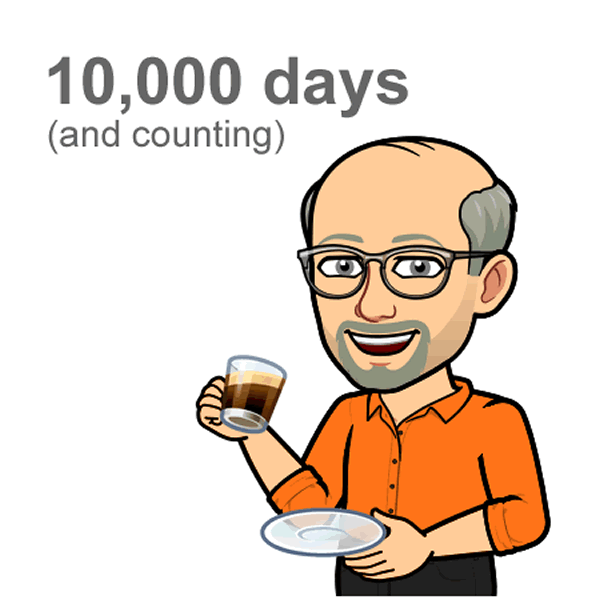
According to our HR system I’ve worked with Wycliffe for 27 years 4 months and 17 days, and according to an online calculator that is 10,000 days. I’m not sure if that is exactly right, but I thought I’d celebrate anyway.
In most jobs establishing a start date would be fairly straightforward, but when I first volunteered it was a bit vaguer. I wasn’t quite sure that I was going to stay, but my first job was writing a 30 second radio ad for why people should come to a ‘multimdia’ event to find out more about Wycliffe, and pretty soon I was helping write recruitment brochures.
In the first of those I included a simple quote: “Every thing I was looking for in a job, except a salary”. And it was. The job used the skills I had for a cause which seemed a fundamental part of mission. I’d ignored the Bible and dismissed Christianity until I was 20 but when I reached a point that I wanted to know whether it was true it wasn’t hard for me to find a Bible and read it for myself. That option wasn’t and still isn’t open to many people around the world.
There were plenty of other roles needed too and there still are. I’m currently in three separate but overlapping roles and filling a gap in a fourth. Today I’ll begin making a few updates the Ethnologue as I try and help fill in some gaps about diaspora population, attending (part of) an online summit on Digital Scripture Engagement in Africa, joining online meetings about the Global Diaspora Services, and probably not getting along to a meeting about EMDC Acadamy, EMDC Blog, and EMDC.guide. There are also quite few emails to respond to and a sermon to write.
This may be my 10,000th day, but there aren’t enough hours in it. I still love my job(s) but we need more people. Who do you know who might want to join?
‘new’ digital Bibles at the start of 2024 January 5, 2024
Posted by Pete B in Uncategorized.Tags: Bible translation, Digital Engagement, YouVersion
add a comment
It’s only a few days into the new year and already the number of languages in which scripture is available on YouVersion is growing, but amongst the new additions are some rather old translations.
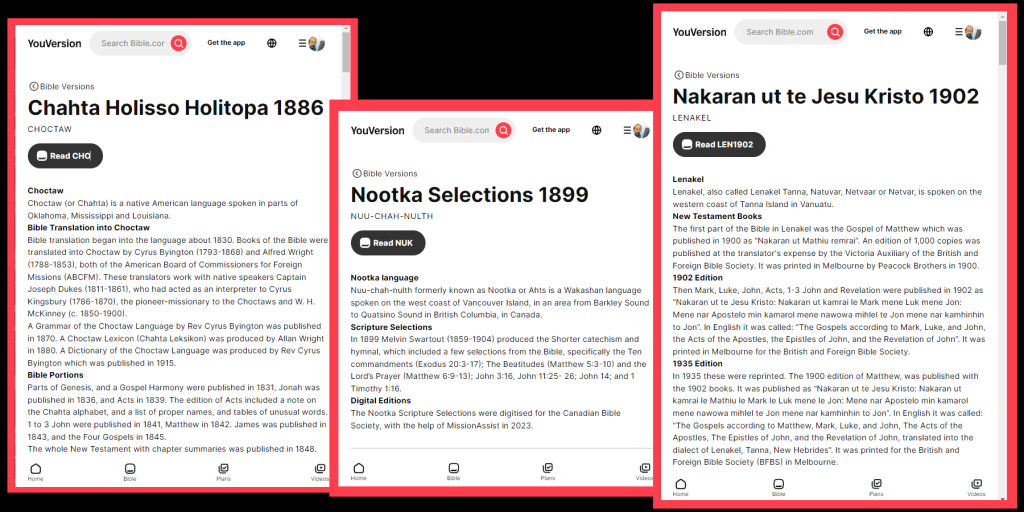
Each of the three versions pictured were added with the help of MissionAssist’s Bible Digitisation Project in which trained volunteers retype portions of scripture or even complete Bibles.
Mission assist explains, “To join us you don’t need to be a linguist, a translator, an expert computer user or even a touch typist.” adding, “Attention to detail is crucial when typing and checking Scripture – the task is well suited to people who really enjoy doing large jigsaw puzzles with small pieces! Just like doing a jigsaw, you can concentrate for a short time then take a break, and complete it at your own pace. There are no set hours – some do a few hours of typing a week, while others do much more, all from their own home.”
So why does this work matter? In some cases newer translations have been completed and older versions are primarily of historic interest and cultural value, in other cases the physical copies of Bibles sitting in archives are the only scriptures translated into a specific language. They may be of use as they are or be helpful in new translation work.
For more information read this Bible Society article from 2000 including a case study about the Kare New Testament of Central African Republic. By the end of October 2020 YouVersion provided scripture in 1,500 languages. In mid 2023 YouVersion reached milestones of both 3000 versions and 2000 languages …and kept going.
But as I mentioned in November in a post on Celebrating and Understanding, “there is ‘something’ published in about 1,200 languages that aren’t yet available via YouVersion (400 of these are available elsewhere on the internet or apps).” and “There is also work started but not yet published in over 1,300 languages, and work still to begin in almost 1,300 more.”
My own page on Bibles and Resources links to sites where Bibles can be found and my hope is that more churches and individuals would point to at least one of these sources.
The goal is not about reaching numerical milestones but reaching people, and that means that Bible translation, as important as it is, is only part of the story. Each one of us can play a part in helping people find Bibles in their own languages, and in telling others about how the Bible has impacts us.
2024 and the end of copyright (for some things) January 1, 2024
Posted by Pete B in Uncategorized.Tags: movies
add a comment
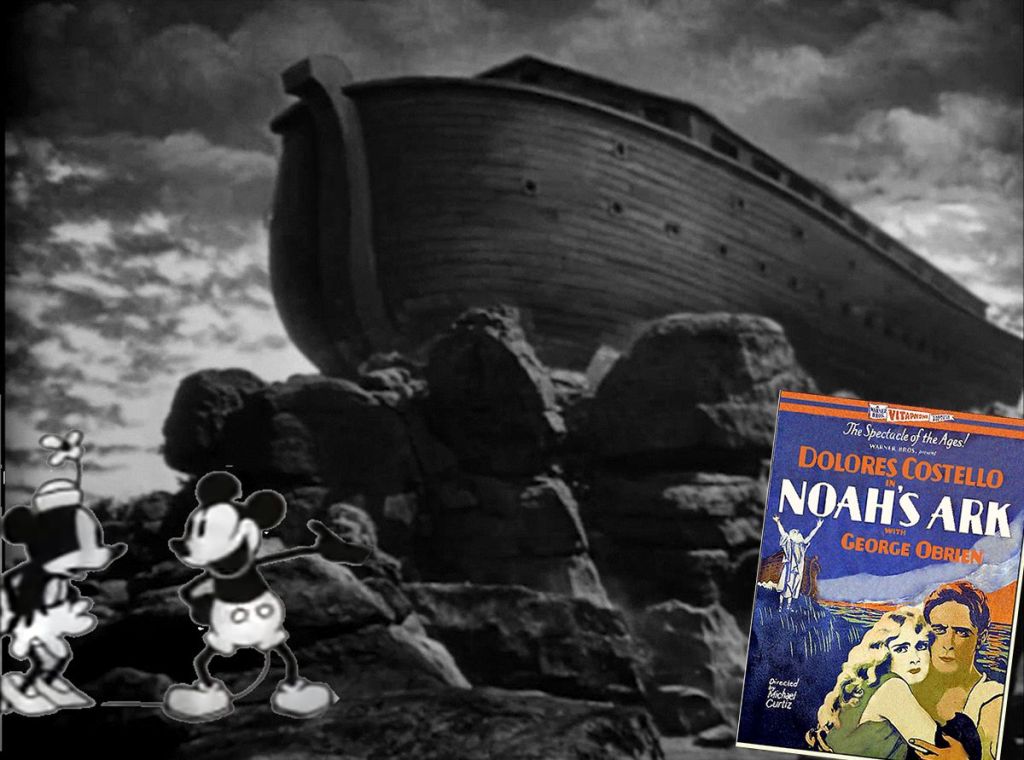
Welcome to 2024! Amongst the early headlines are stories declaring “Disney’s earliest Mickey and Minnie Mouse enter public domain as US copyright expires” The BBC adds that the 1928 animation of Steamboat Willie is “widely seen as the moment that transformed Disney’s fortunes and made cinema history”.
Another influential film of the same year was the 1928 film of Noah’s Ark which you can read more about on Wikipedia and watch at https://archive.org/details/noahsark1928. (Mickey and Minnie do not feature in the movie but the extras do allegedly include a young John Wayne.)
Like some later “Noah” movies this drifts more than a little from the Biblical narrative and while some Biblical epics earned the title “The Greatest Story Ever told” this one was apparently labelled, “the worst picture ever made” though even as early as 1928 there were a few contenders for such a title.
Sadly the all too realistic flood scenes were achieved using 600,000 gallons of water with scant regard for the extras, three of whom drowned and one later had a leg amputated.
Among the other films of 1928 that I haven’t watched was a silent movie about Martin Luther, and an early time-travel movie “Vamping Venus” in which “A present-day stereotypically-Irish American politician is vaulted into ancient Greece after receiving a bump on the head.”
